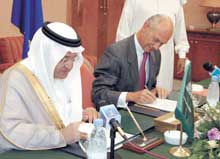JEDDAH, 1 September 2003 — Saudi Arabia and the European Union have signed a bilateral agreement for free access of goods and services as part of the Kingdom’s bid to join the World Trade Organization as early as 2004.
Commerce Minister Hashim Yamani and EU Trade Commissioner Pascal Lamy signed the agreement here yesterday.
“We would like to complete the major steps by the end of 2003. Very early next year, we should be in. That is our target,” Yamani told Reuters after signing the trade agreement.
Lamy said such agreements were important as they helped to create a network of trade pacts and interests that are a force for stability in the Middle East, which has been rocked by the Iraq war and the continuing violence between Israel and the Palestinians.
“The agreement reached with the EU is a step in the right direction,” Saudi economist Dr. Mohammed Al-Sabban told Arab News.
However, when the Kingdom will join the WTO is still not clear. “There are numerous factors involved that need to be ironed out before one can speculate on when,” he said.
“They include the conditions set forth by remaining WTO members and the time it takes Saudi Arabia to accomplish them. There are also conditions set by the Kingdom that need to be addressed before one can discuss the next stage. But I think the Kingdom’s will and determination to become a member of the WTO will also speed things up,” he added.
To enter the WTO, countries need to negotiate bilateral deals with current members of the trade body as well as adopt the WTO’s body of legislation.
The WTO committee overseeing Saudi Arabia’s entry has not met for almost three years, something Yamani wanted to rectify, saying talks could be held in October.
Saudi Arabia must next negotiate a bilateral agreement with the United States, and Yamani was also hopeful in this respect. “After Cancun we hope to sit down with them and finalize a bilateral deal,” he said, referring to the Sept. 10-14 WTO ministerial meeting in the Mexican resort to discuss how to build on the Doha Round of trade negotiations.
“The European Union and the United States are the biggest blocs in the world and reaching bilateral agreements with these two blocs would be a great achievement,” Yamani said.
He added that the Saudi government was determined to push on with reforms of the domestic economy and help the country diversify from its oil dependence.
“Accession (to the WTO) is a way to really get more investors from outside so that our economy can get better,” he said.
The Kingdom is working on the privatization of 20 sectors and has created a training scheme to help curb joblessness among young people.
Yamani said the government wanted to “try to create more legislation and more confidence for investors in Saudi Arabia.”
The kingdom has signed 14 bilateral trade-related agreements with various governments, including Japan, Australia, Canada, Brazil and Argentina.


